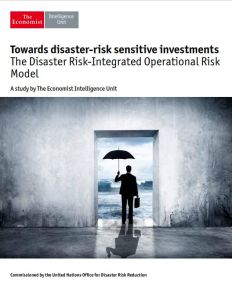Join getAbstract to access the summary!

Join getAbstract to access the summary!
The Economist Intelligence Unit
Towards Disaster-Risk Sensitive Investments
The Disaster Risk-Integrated Operational Risk Model
EIU, 2016
What's inside?
Should businesses always avoid investing in disaster-prone areas?
Recommendation
Natural disasters are an unfortunate aspect of life, but should businesses always avoid investing in disaster-prone regions? Companies need reliable risk information to answer this question. Thus, the United Nations Office for Disaster Risk Reduction commissioned the Economist Intelligence Unit to study this issue. The ensuing report analyzes 20 countries to aid firms’ assessments of hazard exposure. getAbstract recommends these unique and insightful country profiles to policy makers and business executives interested in a better understanding of “tail risks.”
Summary
About the Author
The Economist Intelligence Unit is an independent research and analysis organization.

















































































































Comment on this summary